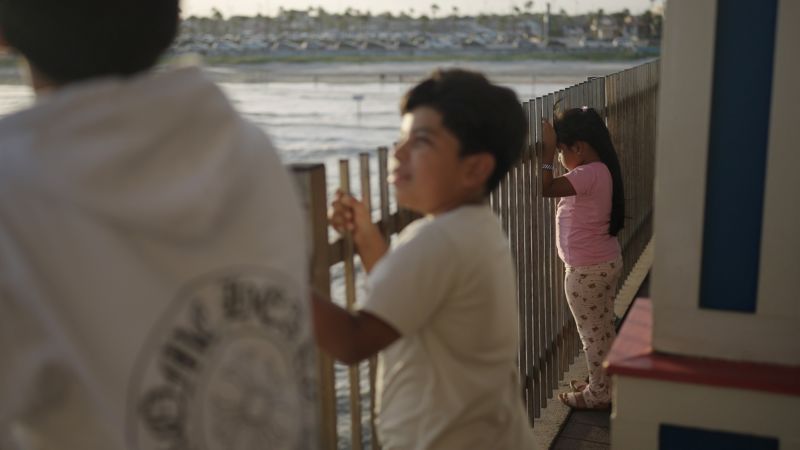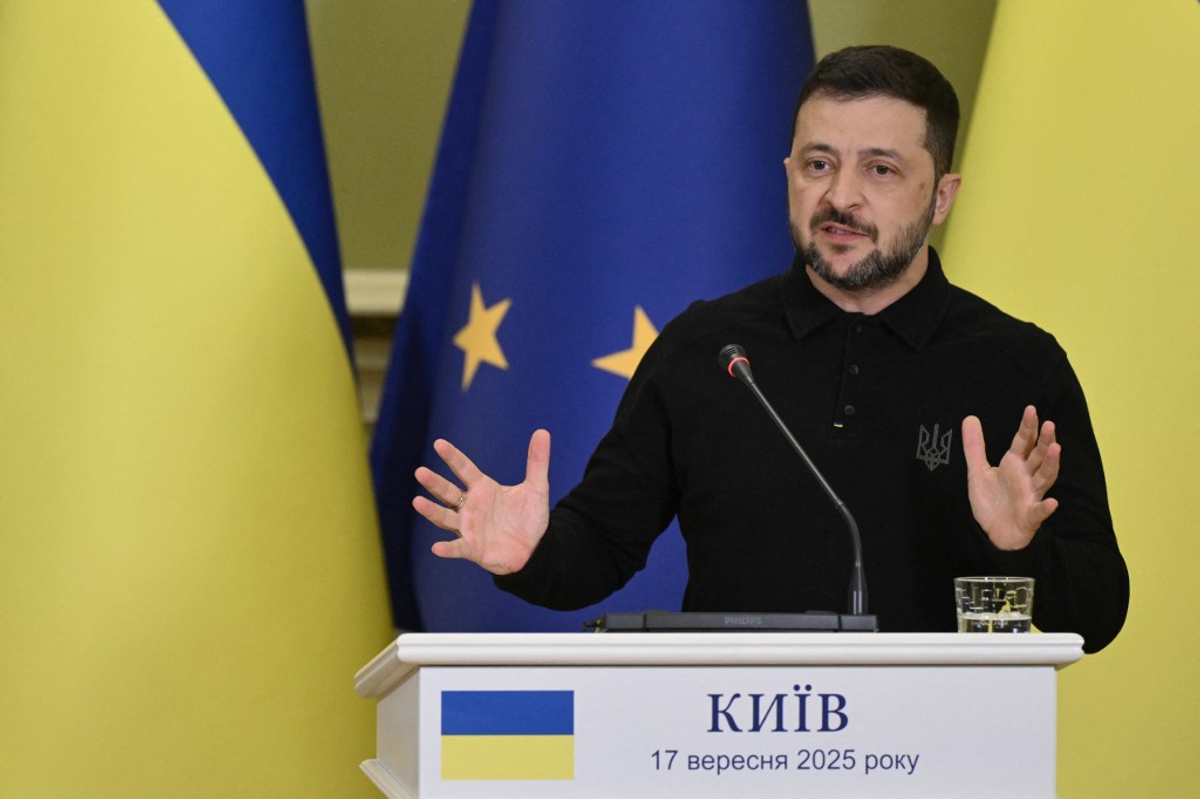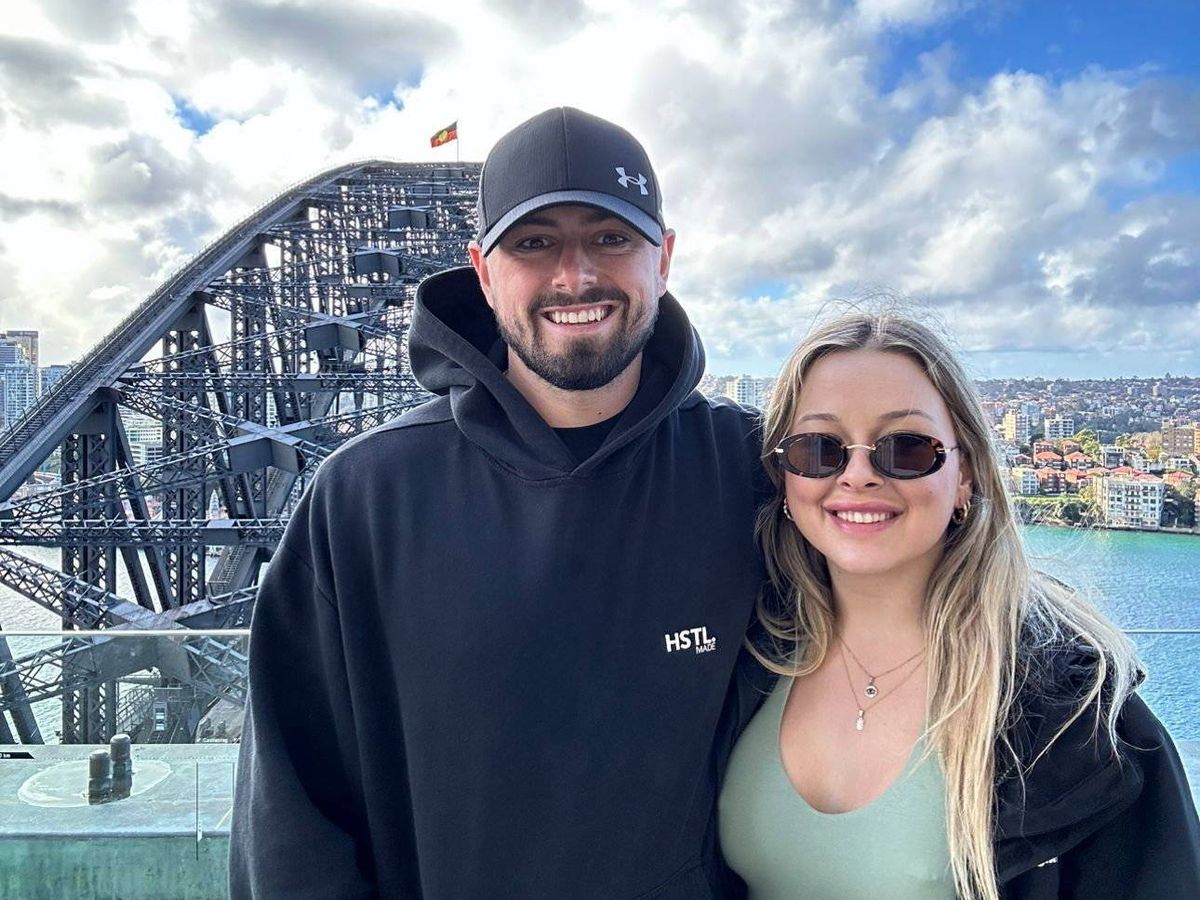‘The new family separation crisis’: More than 100 US citizen kids left stranded by ICE enforcement actions, CNN finds

Febe and Angelo Perez were asleep in their beds when immigration agents came for their mother.
Only 6 and 9 years old, the siblings – both US citizens from Texas – didn’t understand who the men in tactical vests were or what “ICE” was. And they didn’t hear an officer tell their mom, Kenia, that they would be picked up by Child Protective Services and placed into foster care if she couldn’t find someone to take care of them.
All they knew was that their mother, their only parent since their father died five years ago, was being taken from them.
Across the country, US-born children like Febe and Angelo have become collateral damage in the Trump administration’s unprecedented crackdown on undocumented immigrants.
CNN identified more than 100 US citizen children, from newborns to teenagers, who have been left stranded without parents because of immigration actions this year, according to a review of verified crowdfunding campaigns, public records and interviews with families, friends, immigration attorneys and other advocates.
These cases have unfolded as the Trump administration has abandoned the “humane enforcement” of immigration laws when deporting mothers and fathers who entered the country illegally, according to policy documents.
Since President Donald Trump took office in January, American children across the country have ended up in the care of relatives, neighbors, friends, co-workers and even strangers. Their parents were picked up during raids on workplaces ranging from farms to meatpacking plants, coming out of check-ins with Immigration and Customs Enforcement or dropping their kids off at school.
In some cases, ICE appears to have violated protections that still remain in official policies by failing to allow undocumented parents time to find an appropriate caregiver or to make travel plans for their children as they are taken into custody and deported, CNN found. Unlike immigrant children, American children of immigrants do not fall within ICE’s jurisdiction and are not tracked by the agency.
An ICE spokesperson did not provide any data on how many cases the agency is aware of where US citizen children have been separated from their parents and would not comment on the removal of “humane” from official ICE policies. The spokesperson claimed that ICE “goes out of its way” to give parents the opportunity to designate a guardian or have their children accompany them upon removal.
“CNN is trying to obscure the fact that each of the illegal alien parents they are defending willingly chose to break our nation’s criminal and administrative laws and as a result of those choices, are responsible for what happens to their children – just as any U.S. citizen parent who breaks the law is when they are taken to jail,” the spokesperson said.
Accounts gathered by CNN included an autistic 11-year-old who was placed in foster care in Nebraska when her father was picked up by ICE in June, and a 10-month-old left with family friends when her single mother was arrested during a workplace raid at a cannabis farm in Southern California in July. In Michigan, the oldest daughter of four reportedly scrapped plans to attend college in the fall so she could raise her three younger siblings after their widowed father was detained.
“It’s literally a kid’s worst nightmare having someone come take your parents in the middle of the night,” said Wendy Cervantes, a longtime immigration policy expert who has worked with Democratic and Republican lawmakers to help craft federal policies that protect the children of immigrants. “No matter the outcome, you are turning a kid’s life upside down.”
‘Children at risk’
Federal agents donned riot gear and lobbed flash bang grenades and smoke bombs at protesters as they raided a pair of cannabis farms near the California coast this summer. When the smoke cleared, multiple employees were left injured and a worker fleeing one of the facilities plummeted 30 feet from the roof of a greenhouse to his death.
The raids made headlines for the chaotic and deadly scene that unfolded, as well as reports that a protestor fired at ICE agents.
What went largely unnoticed was just how many US citizen children — more than a dozen, according to CNN’s analysis — were left without parents to care for them.
One 15-year-old ended up on his own with his two younger brothers, 8 and 9, when his mother was arrested, her immigration attorney told CNN. From detention, the mother had told the attorney she wanted to see her children as soon as possible. But she was deported to Mexico only three days after the raid.
Martita Martinez-Bravo and her small nonprofit organization, Friends of Fieldworkers, have been attempting to fill in some of the gaps — gathering donations and delivering diapers, formula, clothes and toys to those in need. Since the raids, which swept up more than 300 undocumented workers, Martinez-Bravo’s phone constantly rings. Many families contacting her have had their primary or sole income-earner ripped away, leaving the remaining parent without a way to pay rent and other bills.
She said some of the most alarming calls have come from people who are now unexpectedly caring for children. She recalled one call about a babysitter who showed up to one of the farms with two babies in her arms the morning after the raid. Their parents had never come home, Martinez-Bravo said she was told.
“There is no government support, so all the support that is happening is from nonprofit groups and families,” said Martinez-Bravo. “It’s leaving children at risk.”
Martinez-Bravo wore a cheerful, embroidered red blouse on a Friday afternoon last month when she dropped off a large Target bag full of supplies — including toothbrushes, toothpaste and Lysol wipes — at a one-bedroom apartment where seven people had been living for more than a month.
The apartment had been tight when it was just a family of four living there – two farmworkers and their two children. But then the couple took in three more children – their niece and two nephews – when those kids’ parents were detained and quickly deported.
The aunt and uncle struggled to pay for food and rent, and their landlord told them too many people were living in the small apartment. The stress had become so great that the aunt — who is also undocumented — kept getting headaches. Just the week prior, she ended up in the hospital, she said.
When she could no longer afford a babysitter for the youngest of the children, she said, a family friend drove the 2-year-old boy — a US citizen — across the border to live with his father in Tijuana, Mexico. The father said he had come to the United States days after he found his own father shot dead in his house in Mexico. He said he and his son are now sharing a room with a roommate while his wife stays with her family thousands of miles away. He found a job on a farm and works six days a week, but nets less than $20 a day. After paying for child care, it’s a struggle to afford food and diapers, he said.
Back in California, the aunt says she worries about being separated from her own children, a teenager and 4-year-old, who were both born in the US and are citizens. She wants a better future for them, one where they don’t come home from long days picking produce, caked in mud like her and their father.
“Now I feel sad for everything happening,” she said in Spanish. “What happens if ICE takes me?”
A new kind of family separation
Previous immigration crackdowns had primarily focused on immigrants who had violent criminal records or were recent arrivals.
But now, as immigration agents scramble to meet the Trump administration’s aggressive quotas of 3,000 arrests a day, many immigrants who have lived in the country a decade or longer with no criminal records are being arrested, detained and deported — often within a matter of weeks or even days.
Many parents in the cases CNN identified had dutifully attended immigration appointments, paid taxes and received work permits and other authorization to remain in the country, according to interviews and records from parents, families and attorneys.
In prior policy documents, ICE noted that there were “limited circumstances in which detention is appropriate” for parents. While it was not unheard of under past administrations for immigrant parents to end up deported, ICE has historically given agents “discretion” to prevent children from being separated from their sole caregivers.
ICE has taken a different approach under Trump’s second term. The administration’s “border czar,” Tom Homan, has repeatedly said parents are to blame for entering the country illegally and having children here without being documented. “If (you’re) in the country illegally and you choose to have a US citizen child, that’s on you,” Homan told Politico in July. “If we want to send a message to the whole world … go have a US citizen child and you’re immune … we’re never going to solve this problem.”
ICE echoed this in its statement to CNN, saying that even if an undocumented immigrant attends immigration appointments, pays taxes or receives authorization to work in the US, they “are not absolved of their original offense of illegally entering the country.”
The agency’s “Detained Parents Directive,” meanwhile, has been changed to weaken protections for undocumented parents, most notably removing a written commitment to pursue “humane enforcement” of deportation laws. Instead, the guidance states that agents should “remain cognizant of the impact enforcement actions may have on a minor child.”
The administration’s updated policy still provides that undocumented parents should be given time to find an appropriate caregiver or to make travel plans for their children. Yet, some detained parents have alleged they were not given such accommodations, according to immigration attorneys and accounts detailed in interviews and online fundraisers.
In one case, a young girl was placed in foster care despite having family members who were willing to care for her, according to a nonprofit. In others, parents were deported so quickly that there wasn’t enough time for them to secure passports for their children to be able to join them.
“This ICE is not using their discretion,” said Heidi Altman, vice president of policy at the National Immigration Law Center. “The checks and balances that used to exist are gone.”
In Honduras and Guatemala — two countries many undocumented immigrants are being deported to — parents are arriving without their US citizen children and saying they weren’t given the option to bring them, researchers from the nonprofit advocacy group Women’s Refugee Commission said after visiting both places.
“Some parents were showing up inconsolable because they did not know where their children were or who was caring for them,” said Zain Lakhani, the group’s director of migrant rights and justice. “This is the new family separation crisis.”
In its statement, ICE said parents are given the opportunity to designate a guardian to care for their children or to have their children accompany them when they are deported. “That decision is entirely up to the illegal alien parents, and they are given a reasonable amount of time to make that decision,” the spokesperson said.
Citing the increasing likelihood that undocumented parents could end up in ICE custody, nonprofits have been holding community workshops to help parents consider their options, such as designating guardians for their children in the event they are separated. Lawmakers in several states have also recently introduced legislation to make it easier for parents to designate appropriate caregivers if they are taken.
“We are witnessing families being torn apart in real time — parents detained, unable to pick up their children from school and childcare,” Democratic California Assemblywoman Celeste Rodriguez said in a statement about legislation that is currently awaiting the governor’s signature. “This bill is not just about planning; it’s about creating a safety net.”
Lasting trauma
Mimi Lettunich was in the middle of work when she received a call from an immigration agent asking her whether she could pick up her friend Jackie Merlos’ four children. Merlos was being detained, and if she didn’t immediately find a US citizen to take her kids, they would end up in foster care.
Within hours, Lettunich found herself driving along the highway with 9-year-old triplets and their 7-year-old brother to care for indefinitely.
The children sat stunned in the back seat. Lettunich herself was trying to wrap her mind around what was happening, she told CNN. She couldn’t understand why immigration authorities would take away Merlos and her husband, well-regarded local business owners who had come to Portland, Oregon, from Honduras decades ago.
Lettunich hadn’t cared for young children in years — her own kids were now grown up. And she had a full-time job. As they drove to her Portland home, she realized she and her husband hadn’t even started to think about what they needed or how this was all going to work: Did they have toothbrushes? Where were they going to sleep? What were they going to have for dinner? How do we make sure they feel comfortable but also give them their space?
That first night at Lettunich’s, the children slept in their clothes because they didn’t have pajamas. She comforted them before bed, telling them they were safe and reading them stories. She told them they could think of this as “summer camp,” and the kids now call it “Camp Reindeer” because of how many deer they see in the backyard. In the days and then weeks that have followed, she and her husband have taken the kids swimming, to the zoo and out to dinner — anything to try to cheer them up. Because they have had to keep working too, they enrolled the children in day camps, and they often visit their parents in detention on the weekends.
But Lettunich said she worries every day about the impacts that they will be coping with for the rest of their lives because of the ordeal. “They fear for their parents,” she said. “They ask, ‘are Mom and Dad not coming home?’”
One of the kids has been keeping everything bottled up, she said. He doesn’t want to hear anything about what happened or talk about it, only wanting to “think of happy things.” And all of the children have started talking with a psychiatrist to try to begin processing the trauma, she said.
Less than three hours away in her cell at an ICE detention center in Tacoma, Washington, their mother, Jackie Merlos, is grappling with her own emotions, writing regular journal entries about her experience and her worries. US Customs and Border Protection, which initially detained Merlos and her husband, told CNN she was arrested “as she attempted to smuggle illegal aliens into the United States” and that formal removal proceedings were underway. Neither Merlos nor her husband has been charged with a crime related to this allegation, however, and Merlos has said she and her family were simply meeting her sister — a Canadian resident — at a park along the US-Canada border. ICE did not comment.
It has been more than 70 days since Merlos was separated from her kids, and her next court date isn’t until the middle of October.
“I feel powerless not being able to see or hug my children, play with them, and watch them grow,” she wrote a week after her children were separated from her. “I’m suffering, and my children are suffering psychologically. It’s not fair to separate children from their mom and dad.”
Sometimes Merlos convinces herself that what is happening is just a nightmare that she will wake up from. “My life feels meaningless without them,” she wrote.
But until the whole family is reunited, she urged her children to keep praying and to continue living their lives without her.
“Please don’t stop practicing your piano (David), guitar (Carlitos), violin (Abigail), and piano (Caleb),” Merlos wrote.
An untracked issue
Pleas for donations to help stranded children have been popping up online since immigration efforts ramped up earlier this year.
In some cases, the children themselves are asking for financial support to help pay for food, rent and utility bills. Teenagers describe being left on their own with younger siblings, and recent high school graduates say they have dropped out of college and returned home in the hopes of keeping their siblings housed, fed and out of the care of strangers.
“My mother is the most hard working woman I know, she is a single mother of 3 and has worked for us to always have everything we need and everything she’s had worked for her whole life was just taken away from her,” a daughter wrote in a July fundraiser. “Truly anything helps.”
Because the number of kids left behind by the ongoing ICE raids and deportation efforts is not being publicly tracked, CNN used the crowdfunding platform GoFundMe as a way to provide a snapshot of the issue, as well as interviews with families and attorneys, who confirmed additional cases to reporters. CNN’s count of more than 100 US citizen children does not include dozens of children whose citizenship status or age was unclear, or where fundraisers couldn’t be verified.
The fundraising accounts, which GoFundMe confirmed to CNN had been verified by the company’s trust and safety team, also served as a window into where separated children have ended up. Some were taken into foster care. Most were being cared for by family friends, community members or relatives.
ICE said it couldn’t comment on CNN’s analysis because it included anonymous families and some of the information had come from what it called “notoriously biased and unreliable” crowdfunding websites. The spokesperson did not respond to questions about how often children were ending up in this situation or whether this was something being internally tracked by the agency.
Immigration experts said said it is difficult to fully assess how widespread the issue is until the federal government comprehensively tracks and releases that data. There are millions of US citizen children living in households where their only parent or both parents are undocumented, Brookings Institution research shows.
Attorneys told CNN about cases ranging from an 8-year-old who allegedly watched her single mother get handcuffed and taken away by ICE to a one-year-old who is currently living with a foster family as the toddler’s mom fights for custody from detention.
“It’s stunning that we’re putting so much emphasis on hitting deportation numbers, and not thinking about all the collateral damage we’re doing,” said Leecia Welch, deputy litigation director at nonprofit Children’s Rights, who has been visiting families in immigrant detention centers to monitor conditions. “We’re traumatizing everybody involved in these situations and completely destabilizing their lives and causing long-term trauma.”
‘It terrifies me’
It was around 6:30 in the morning when Kenia Perez arrived home from her overnight shift at the hospital.
She had stopped at the store to get milk for her daughter’s cereal and was planning to go inside and wake her kids up and get them ready for school, when she saw two large, unfamiliar cars parked outside her apartment.
ICE agents were waiting for her.
“Run away as far as you can,” she texted her 14-year-old son, Isaac, who jumped out the window. Since Isaac was also undocumented, she worried ICE would take him too — leaving Febe and Angelo without any family in the country.
Agents in tactical vests and local police officers surrounded her in the parking lot.
Desperate to keep her children out of foster care, her next call was to Jeff Chaney, a family friend and coworker who had agreed just a day earlier to take guardianship of the children if ICE came for her — something she had become increasingly nervous about under the Trump administration.
Perez had been in the US for roughly a decade, fleeing cartel violence in her native Honduras. She described to CNN how she was assaulted, raped and left in a dumpster on her journey. She was pregnant when she was apprehended at the border and records show she was released under an order requiring regular check-ins with ICE. She met and married her husband in the years that followed and created a family in Galveston, Texas. Only months after she gave birth to her third child, her husband passed away from Covid in 2020, and she suddenly became the sole caregiver for her three children — two of whom, Febe and Angelo, are US citizens.
Perez said she paid taxes and documents show that she never missed a check-in with ICE. Her work permit is not set to expire until the spring of 2026. But ICE came for her anyway.
Unlike other cases examined by CNN, Perez said she was allowed to go into her apartment, wake her children, and tell them goodbye.
“I need you to be strong,” she remembers telling Febe and Angelo. “You see those men. They’re going to take Mom.”
Perez prayed she would be able to take her children with her to Honduras. Even though she knew it would be dangerous, she couldn’t imagine being separated.
But she was deported 11 days after her arrest, leaving her friend, Chaney, trying to lighten the kids’ moods. He took them to IHOP on the weekends and held movie nights at his house.
Chaney couldn’t keep the kids at his house given the long hours he worked at his two jobs, so the children spent several days bouncing around among a network of Perez’s coworkers’ homes until one of her undocumented friends gave them a place to stay, at least temporarily. Because the kids didn’t have access to any of the funds Perez had saved from her job, community members began supporting the family through a GoFundMe campaign.
In an interview with CNN, Chaney said that when he voted for Trump last year, he understood that immigration enforcement was a top priority for his administration. He supported the Republican Party’s promise to secure the border and to go after criminals and gang members.
But he never imagined that someone like Perez, his close friend and co-worker, would end up caught in the crackdown.
“This is not what I voted for,” he said, adding that he never supported the targeting of working-class people who had been doing everything right. “You don’t do this. This is inhumane what they’re doing.”
An ICE spokesperson told CNN Perez asked to be reunited with her children before she was deported, but that she refused to provide agents with their specific location. Perez told CNN she did not want to endanger any of her undocumented friends who were helping to care for her kids when she was first arrested, but that she had hoped that while she was in detention, she would have an opportunity to secure their passports so that they could be reunited when she was deported. “After exhausting all efforts, ICE proceeded with her removal in accordance with federal law,” the spokesperson said in a statement.
The spokesperson described Perez as an “irresponsible parent,” who “chose to use her children as a bargaining chip in an attempt to prevent her own removal from the country.”
“Any claims by her now that ICE improperly separated her from her kids are patently false and just another attempt to manipulate the system for her own benefit,” the spokesperson said.
From a small home on a dirt road in a neighborhood of San Pedro Sula, Honduras, known for gang violence, Perez called her kids every night, telling them everything was going to be OK. Her daughter’s dolls and her son’s toys sat waiting for them, along with two spots next to her in her bed.
More than two months after she was deported, Perez was finally able to secure the paperwork and passports needed for Febe and Angelo to reunite with her in Honduras, where her oldest son had also joined her. But she told CNN she worries about her children and the life they will have in one of the most violent countries in the world.
“It terrifies me,” she said. “I don’t like the decisions I’m making, but I’m tied hand and foot.”
METHODOLOGY
CNN’s analysis, which provided a snapshot of the number of US citizen children being stranded by ICE actions, included accounts from interviews with families, attorneys and nonprofit organizations, as well as fundraisers from the crowdfunding platform GoFundMe. CNN provided GoFundMe with a list of roughly 150 campaigns to confirm which fundraisers had been verified by the company’s Trust & Safety Team as part of its standard verification process, and reporters contacted the organizers and family members. The count does not include dozens of children whose citizenship status or age was unclear, or where fundraisers couldn’t be verified.
CNN’s Abel Alvarado, Norma Galeana and Yahya Abou-Ghazala contributed to this report.



